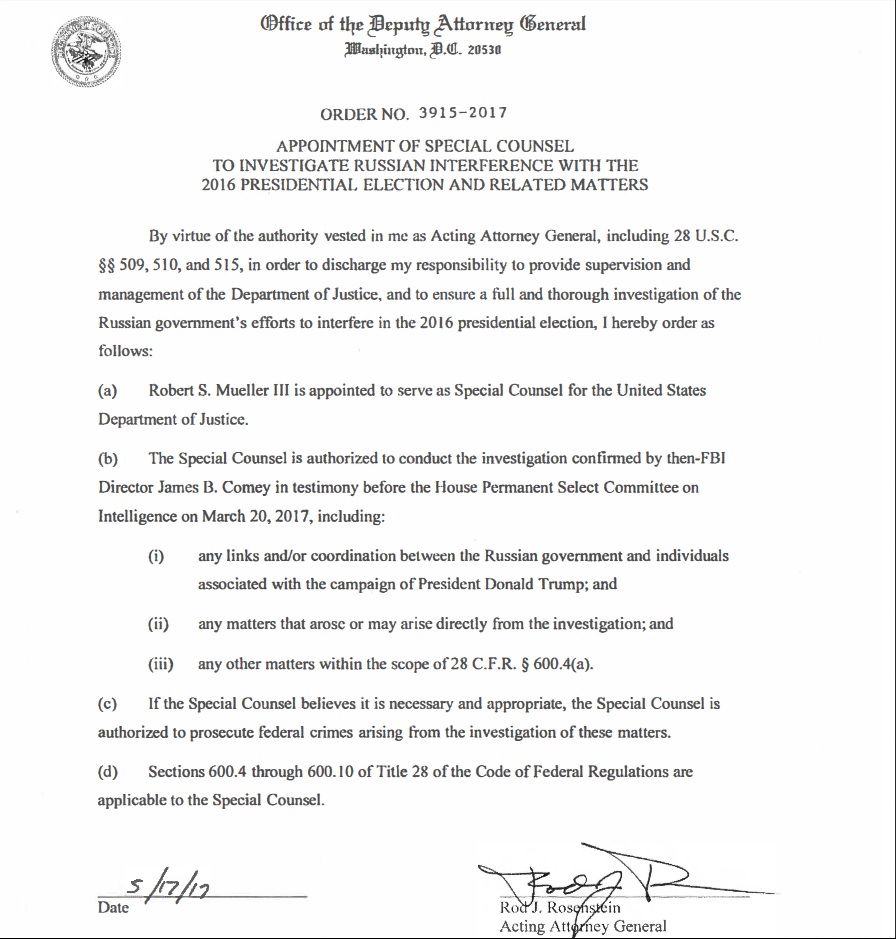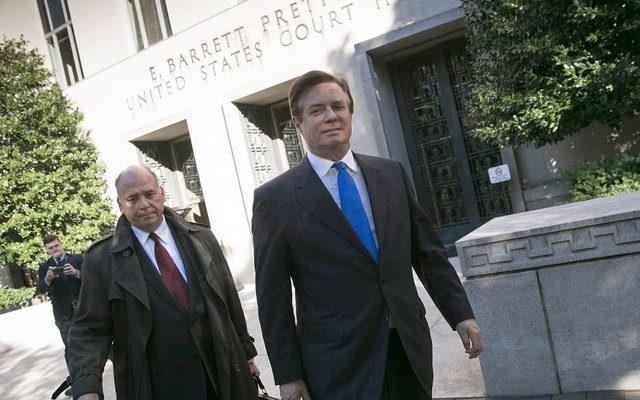Sorry to those of you expecting Part II of our 2018 SPORTS AND POLITICS PREVIEW – 365 QUESTIONS AND ANSWERS. You’re going to have to wait until tomorrow. Why? Because Paul Manafort went and filed one of the most frivolous lawsuits I have ever seen. And that’s putting it nicely.
How We Got Here
The Justice Department is seeking to uncover what connection Trump, the Trump Campaign, and the Trump Administration had and/or have to the Russian government and its agents. Because Attorney General Jeff Sessions is a part of two of those three, he correctly recused himself from overseeing the investigation.
As such, Deputy Attorney General for the United States Department of Justice, Rod Rosenstein, became Acting Attorney General for purposes of the Russia investigation. Rather than have the Justice Department, which is part of the Executive Branch, investigate, Rosenstein appointed a Special Counsel. He chose former Director of the FBI, Robert Mueller, to lead the investigation. Mueller was selected to head the FBI by President George W. Bush by the way. Here is the Appointment Order:

Thereafter, Mr. Manafort was indicted by Mueller for being less than forthcoming with his overseas bank accounts and foreign contacts. Manafort, notably, also ran the Trump Presidential campaign in 2016 from late March to early August. He is not happy that he has been indicted. Below are the 3 reasons why Manafort v. United States Department of Justice, et al. is so ridiculous as to warrant this piece.
1. Manafort Ridiculously Argues That Mueller’s Investigation Into Him Extends “Far Beyond” Links and/or Coordination between Trump’s Camp and Russia.
First off, puh-lease. Ok, now that I got that off my chest, let’s dive in.
Manafort’s claim here is that Mueller indicted Manafort for reasons that, “with limited exceptions, predate Mr. Trump’s campaign.” There’s a red flag in case you missed it: “limited exceptions.” That’s the legal equivalent of a ballplayer committing a foul then raising his/her arms with the “who me?” gesture.
The lawsuit alleges that Mueller’s investigation into Manafort went “far beyond” links between Trump and Russia. After all, Manafort merely worked for a Ukrainian politician. What’s the big deal?
Manafort’s lawsuit goes on to say that since at least 2007, “prominent news outlets reported that, in 2005, Mr. Manafort had begun working for Viktor Yanukovych, a Ukrainian politician, to reinvent his public image.” In fact, the lawsuit continues: “[O]n July 30, 2014, Mr. Manafort voluntarily met with DOJ prosecutors and FBI agents to discuss his offshore political consulting activities.” See, nothing fishy going on here!
Wait, who was that Ukrainian politician, Viktor Yanukovych? So glad you asked! He was elected President of Ukraine in 2010. Three years in, Yanukovych rejected an EU association agreement in favor of pursuing a Russian loan bailout. That, you might remember, led to violent clashes between the pro-Yanukovych Russia supporting Ukrainians and the pro-European Union Ukrainians. Yanukovych did some traveling, found himself in Crimea (which Russia later annexed), then in Russia come early 2014. He remains in Russia in exile. Don’t worry though. Yanukovych was granted Russian citizenship by Vladimir Putin. Cherry on top: Yanukovych is wanted for treason in Ukraine.
So how could anyone draw any possible ties between Manafort’s dealings with Yanukovych and possible Russian ties? Pretty easily actually.
Mueller 1 – Manafort 0
2. The Lawsuit Attempts to Establish a Legal Standard That Doesn’t Exist.
Manafort’s lawsuit revolves around the idea that Section (b)(ii) of the order appointing Mueller is overbroad and outside the scope of what is allowable for a Special Counsel to investigate. The subject section includes language enabling Mueller to investigate “any matters that arose or may arise directly from the investigation”. Manafort’s lawsuit cites to the “original jurisdiction” of a special counsel (the ground rules for what a special counsel can do): “. . . The Special Counsel will be provided with a specific factual statement of the matter to be investigated.”
Here’s Manafort’s argument: “any matters that arose or may arise directly from the investigation” is not a specific factual statement. But here’s Manafort’s problem: The allegation that the Appointment Order’s language isn’t specific lacks any, well, specificity. They fail to give any authority as to what makes the Appointment Order “overbroad” and “outside the scope.” It is true that the pleading need not cite the authority for every assertion; however, that sure didn’t stop them from including agreeable authority elsewhere.
However, even if Mr. Manafort is correct with regard to the original jurisdiction argument, which he isn’t (that’s a more boring analysis), there’s a second part of a Special Counsel’s jurisdiction. The lawsuit even cites the “additional jurisdiction” language included in what a Special Counsel may investigate:
If in the course of his or her investigation the Special Counsel concludes that additional jurisdiction beyond that specified in his or her original jurisdiction is necessary in order to fully investigate and resolve the matters assigned, or to investigate new matters that come to light in the course of his or her investigation, he or she shall consult with the Attorney General, who will determine whether to include the additional matters within the Special Counsel’s jurisdiction or assign them elsewhere.
Unfortunately for Mr. Manafort, here is a portion of the testimony that Rod Rosenstein, Acting Attorney General for the purposes of the Russia Investigation, gave to Congress: “I know what [Special Counsel Mueller]’s doing. I’m properly exercising my oversight responsibilities, and so I can assure you that the Special Counsel is conducting himself consistently with our understanding about the scope of his investigation.” Even better, when asked about the criminal charges against Manafort, Rosenstein stated that he is “comfortable with the process that was followed with regard to that indictment.” Therefore, even if Manafort wins on original jurisdiction, which again, he won’t, he still loses. Mueller acted properly based upon Rosenstein’s sworn tesimony to Congress.
Mueller 2 – Manafort 0
3. Manafort Doesn’t Have Standing to Bring This Lawsuit.
The term standing refers to a person’s ability to bring a lawsuit. If you don’t have standing, you can’t sue. The courts have addressed this: “For a plaintiff to have prudential standing under the [Administrative Procedure Act], the interest sought to be protected by the complainant must be arguably within the zone of interests to be protected or regulated by the statute in question.” Dismas Charities, Inc. v. United States DOJ, 401 F.3d 666 (6th Cir. Ky 2005). Further, a plaintiff must “demonstrate that he has suffered ‘injury in fact,’ that the injury is ‘fairly traceable’ to the actions of the defendant, and that the injury will likely be redressed by a favorable decision.” Bennet v. Spear, 520 U.S. 154, 162 (1997).
Translated into English, Manafort has to show a logical connection between the intent of the statute and his being indicted by Mueller. Call me crazy, but I don’t think that legislators were all that worried about protecting political consultants who lobby for foreign politicians with connections to our enemies when they created the rules and regulations governing Special Counsel appointments.
Moreover, Manafort has to show that undoing the action will lead to a favorable decision. That’s where Manafort loses even were he to win on the initial test, which he wouldn’t. Even if Manafort’s interests were within the zone of interests to be protected, his injury will not be redressed. If Mueller’s indictment of Manafort gets tossed, another federal prosecutor will get the exact same indictment against Manafort. Game over.
Side Note: It’s funny researching this because people who are indicted don’t file civil suits to stop federal agencies from doing their jobs. Most of the case law in this area deals with tax and environmental regulations, not alleged criminals seeking to have indictments tossed.
Mueller 3 – Manafort 0
So Why Did Manafort Waste Time and His Own Money Bringing This Ridiculous Lawsuit?
First, one could argue that he wants two bites at the apple. Manafort was indicted in criminal court. This is a civil suit as iterated above. He’s hoping that the civil judge throws out the criminal complaint. If he loses this one, he can still file a motion to dismiss, with the same arguments, in his criminal case.
Second, Manafort is trying to set the tone in the court of public opinion by striking back at Mueller. He wants to make it look like Mueller is Ken Starr on steroids (Ken Starr, you probably remember, was the independent counsel who led the Monica Lewinsky investigation. That investigation led to new rules governing these sorts of investigations. Funnily enough, Manafort cites the Starr investigation as a rationale for why Mueller is exceeding his authority. Ergo, one could argue that he’s painting President Bill Clinton as the victim of a political hit job in the same way that Manafort believes he is now the victim of a political hit job.) In short, Manafort wants Mueller to seem like an anti-Trump bully.
Third, and this is my personal favorite, he’s trying to vie for a Presidential pardon from Trump. The Donald values loyalty. What’s more loyal than trying to take down Mueller, the man trying to take down the Trump Administration?So what’s the problem? Trump only values loyalty when it serves his own purposes. Pardoning Manafort doesn’t serve any purpose of Trump’s. The indictment against Manafort makes it clear that Mueller is not seeking Manafort’s cooperation at this point. Whether he was at any previous time, who knows? But there’s not going to be a deal for Manafort now, or at any time in the future.
To conclude, Paul Manafort will lose and lose bigly.




















“That’s the legal equivalent of a ballplayer committing a foul then raising his/her arms with the “who me?” gesture.”
Lolol another great article